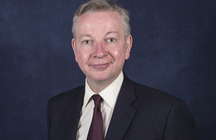The article written by Michael Gove, the then Education Secretary, in the Daily Telegraph on 1 April 2011. The article was released as a press release by the Department for Education.
Politicians probably shouldn’t make fashion statements. Few of us are likely to attract admiring glances on any catwalk. But this year, there is one must-have accessory that no one should be seen without: a book.
Books complement any outfit and suit any season. But far too few of us make sure we’re carrying one. And we certainly don’t follow the first rule of fashion – to work the racks. We’re not picking up enough new books, not getting through the classics, not widening our horizons. In short, we’re just not reading enough.
Visiting America last month, I was struck by the way a culture of reading is instilled in every child at the earliest possible age, even in schools serving the poorest pupils. In Washington DC, a group of children stopped, in the middle of an engineering project, to tell me about their favourite novels, from sci-fi to Charlotte Bronte. In one school run by the charter chain KIPP, every child was expected to carry a book at all times, so they could fill every vacant minute. In another KIPP school, children were challenged to read 50 books a year. This played to both their competitive instincts and their restless curiosity. A love of reading was seen as a winner’s trait.
Across America, childhood reading has been encouraged in recent years by ‘Drop Everything And Read Day’ on April 12, which asks children to stop whatever else they’re doing and get lost in a book. In many charter schools, every day is a DEAR day: reading for pleasure becomes as natural as breaking for lunch.
The children I met were smart and lively. But they were also, overwhelmingly, from the most disadvantaged homes. That didn’t mean their teachers lowered the bar. Quite the opposite. They wanted to give those children a chance to enjoy the glittering prizes – so they set expectations high, fostering a culture of excellence and making clear that nothing is as enjoyable as getting to know what the finest minds of all time have thought and written.
I want the same culture here. I want to take on the lowest-common-denominator ethos, the “let’s not be too demanding”, “all this smacks of targets”, “the poor dears can’t manage it”, “the idea of a canon is outmoded”, “it’s all on the internet anyway” culture which is anti-knowledge, anti-aspiration and antithetical to human flourishing.
Instead, I want a culture in which the more you read, the more you are celebrated. That’s why I have said we should set our own 50 book challenge. And that’s also why I want to develop a stronger and more durable culture of reading for pleasure. The need for urgency can’t be overstated. In the last 10 years we’ve slipped down the world rankings for literacy from 7th to 25th. And the poorest are suffering most. In 2009, more than one in five 14-year-old boys had a reading age of 9 or less: among white, working-class children, 63% couldn’t read and write properly.
Even when children do engage with books, our constricted exam system doesn’t encourage them. The curriculum suggests authors from Pope and Dryden to Trollope and Tennyson – but the English Literature GCSE only actually requires students to study 4 or 5 texts, including one novel. In exams more than 90% of the answers on novels are on the same three works: Of Mice and Men, Lord of the Flies and To Kill a Mockingbird. Indeed, out of more than 300,000 students who took one exam board’s paper last year, just 1,700 studied a novel from before the 20th century: 1,236 read Pride and Prejudice, 285 Far from the Madding Crowd and only 187 coped with Wuthering Heights.
This is why the government is taking action to encourage wide reading, for pleasure, again. We’ve already extended the Booktrust programme to help disadvantaged children develop their love of reading. This week, a new report has set out plans to put a new emphasis on literacy. Next year, we’re introducing a new check at age six to make sure children are on the right path. And shortly I’ll be announcing plans to ensure that our exams work to encourage broad reading.
But we can’t just leave it to our teachers: we need to develop our own Drop Everything and Read initiative, and support competitions like the 50 Book Challenge. This country has the best children’s writers in the world. But while we celebrate Pullman and Rowling, Morpurgo and Rosen, Horowitz and Higson, many of our young people are growing up in ignorance of their work. That’s unacceptable. It’s my mission to change what we expect of young people, and reverse the fashionable assumption of far too many in education that children shouldn’t be challenged to achieve far more. In particular, I want the next generation to grow up with a real sense of style – the elegant prose style of those who have made the English language the greatest source of beauty in our world.
